Published May 12, 2023
How Nurse Alyssa Ogawa Paved an Aspirational Future for Asian American Women
During a time of ‘narrative scarcity,’ Nurse Ogawa showed that you could have it all — meaningful friendships, thriving career, and trusting romance.
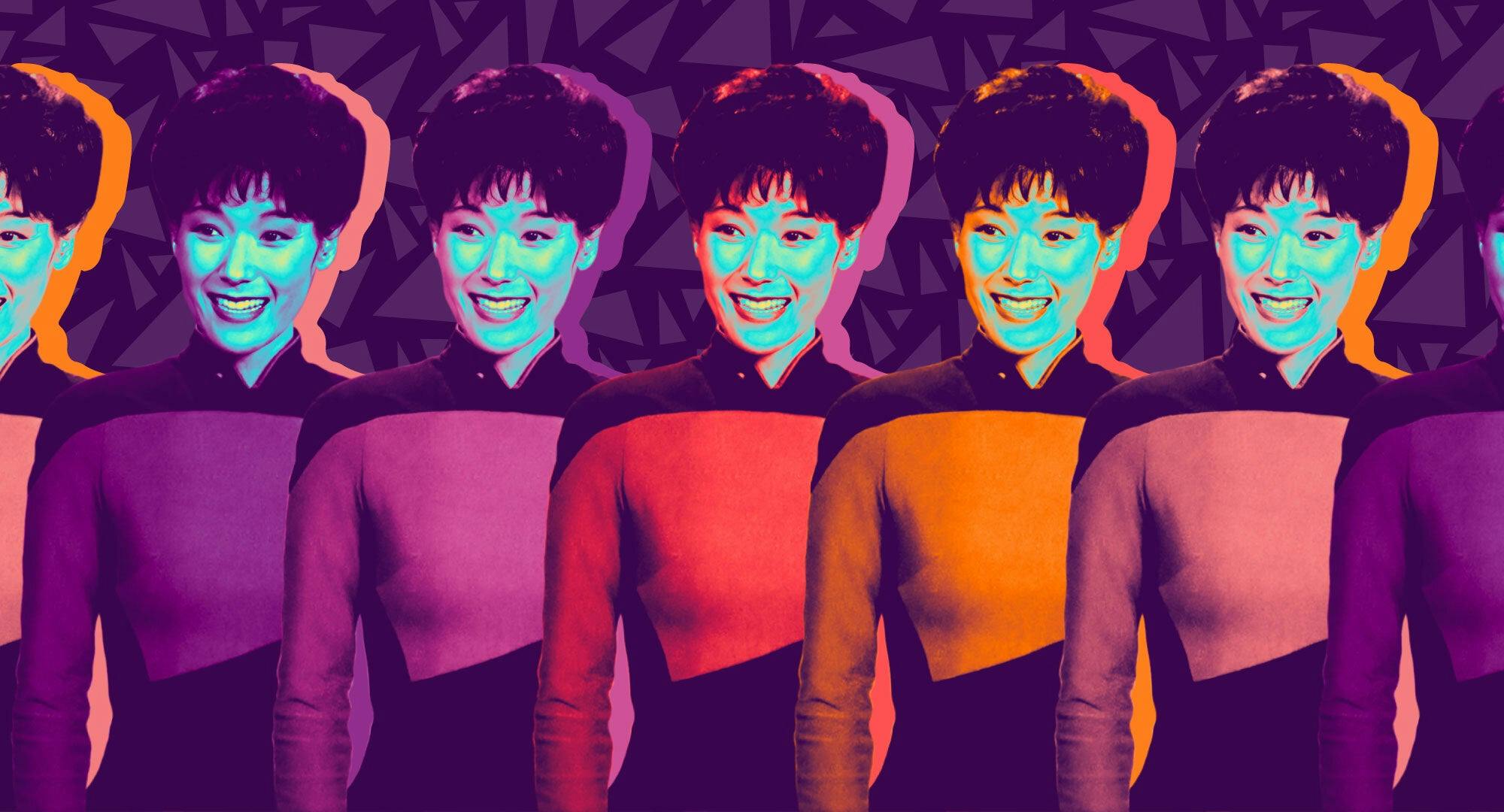
StarTrek.com
In the vast and ever-expanding Star Trek universe, there have been countless characters that have captured the hearts and inspired the imaginations of fans for nearly 60 years. From fearless leaders like Sisko and Janeway to the crew you wish to be friends with like Uhura and Mariner to those who helped us see the best of humanity like Data and Hugh, the franchise has no shortage of unforgettable characters that have become cultural touchstones.
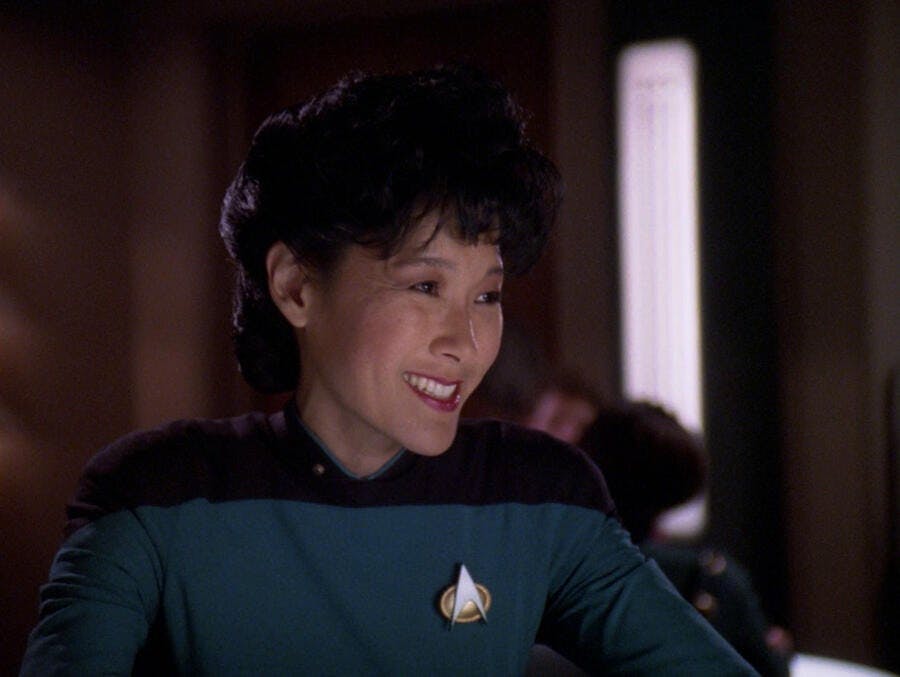
StarTrek.com
As we celebrate International Nurses Day today and Asian American Pacific Islander Heritage Month, there is one character deserving special recognition — Nurse Alyssa Ogawa of the U.S.S. Enterprise-D.
Ensign Ogawa
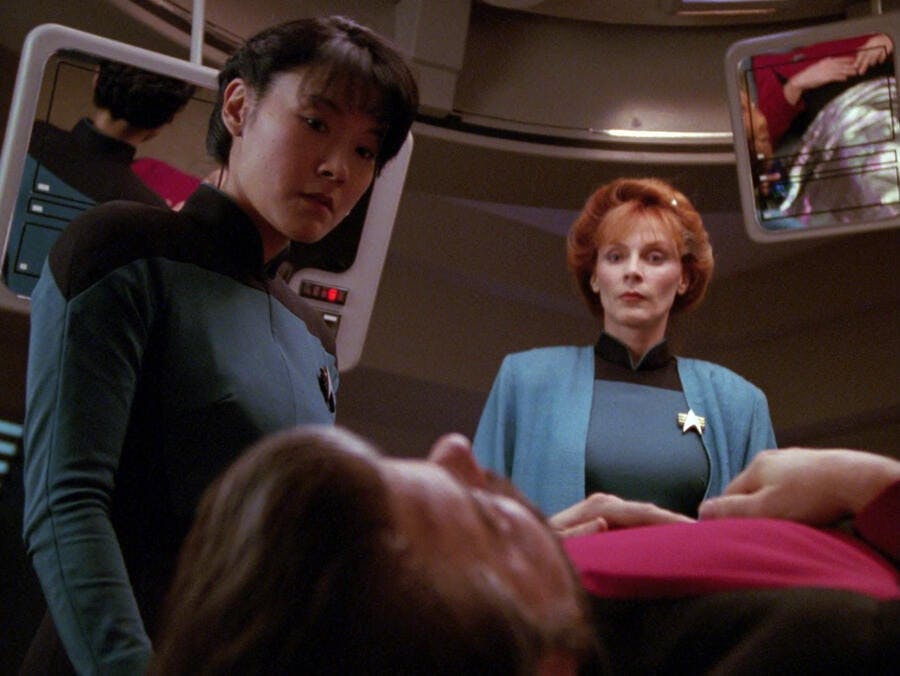
StarTrek.com
Starfleet officer Alyssa Ogawa, played by Patti Yasutake, made her first appearance on Star Trek: The Next Generation in “Future Imperfect,” albeit as part of a holo-simulation of an illusory future designed to fool William Riker.
Across her 16 appearances on The Next Generation, she quickly proved herself to be an integral member of the medical staff. We see Nurse Ogawa earn several promotions and commendations, rising the ranks from ensign to her well-deserved promotion to lieutenant junior grade to full lieutenant aboard the Enterprise-E as seen in her final appearance in Star Trek: First Contact.
Thanks to Nyota Uhura and Hikaru Sulu’s groundbreaking presence in the original series, we were fortunate to gain the Asian-American Ogawa’s presence on the Enterprise, which helped to increase representation and diversity in the franchise, and showcased that crew members of all backgrounds can contribute to the success of Starfleet.
Skilled Starfleet Officer
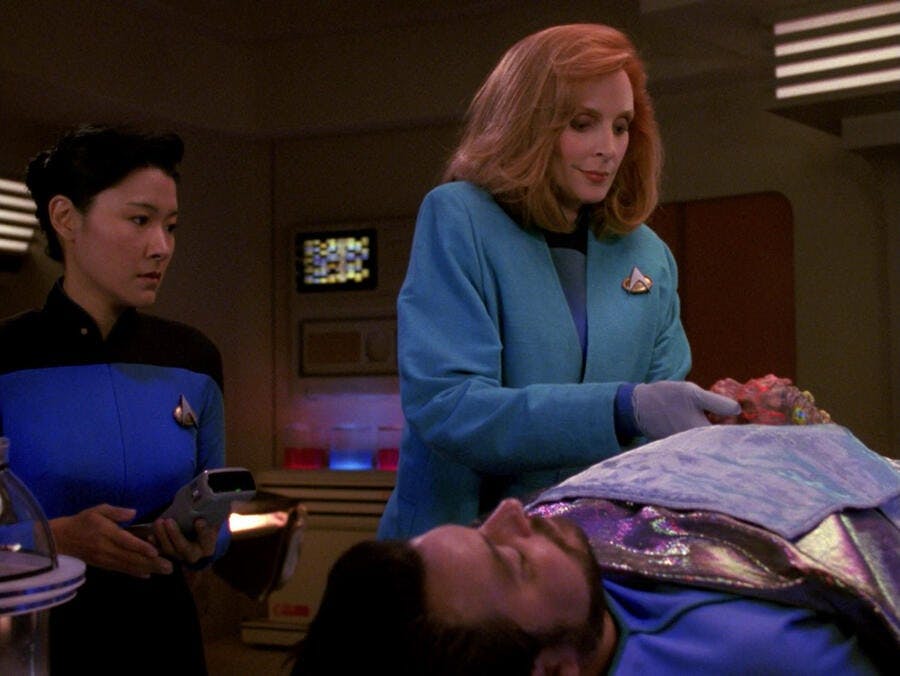
StarTrek.com
As one of the head nurses in Dr. Crusher’s Medical Bay, Alyssa was essential to the health and wellbeing of the entire crew aboard the Enterprise. She was compassionate, intelligent, and dedicated to her job, and her contributions to the Enterprise’s missions cannot be overstated.
Her Starfleet career aboard the starship was characterized by her hard work, dedication, and commitment to her duties. We witness her professional growth and coolness under duress time and again aboard the Enterprise, willing to take on additional responsibilities. She's called upon to assist in critical medical procedures and emergency situations, which showcase her competency and expertise.
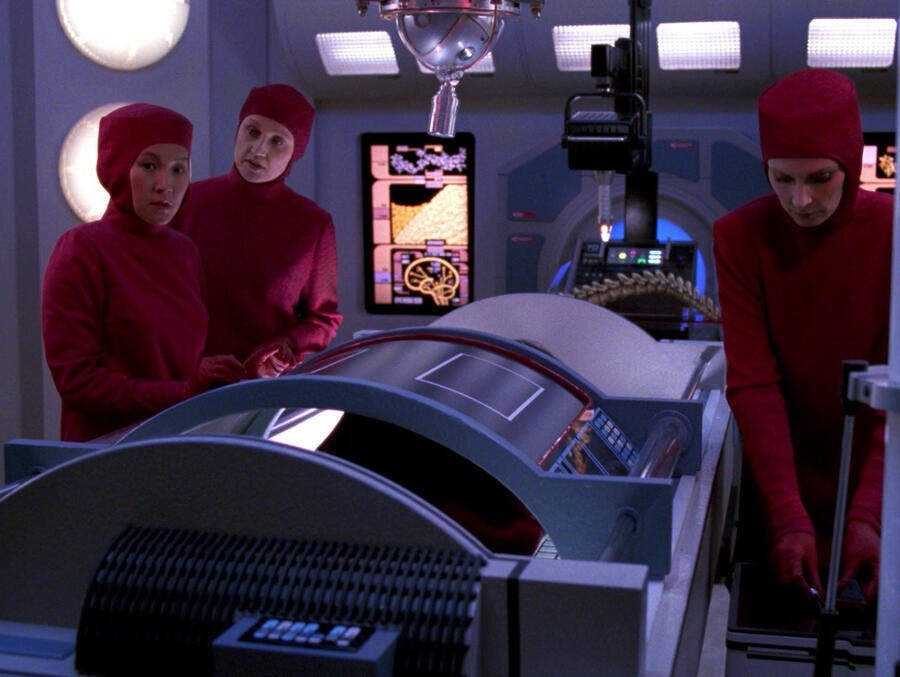
StarTrek.com
In “The Host,” Nurse Ogawa demonstrates her medical competencies as she and Dr. Crusher implant a Trill symbiont into temporary host Commander Riker, which were the first Federation observations of the Trill society and its joined, symbiotic nature between humanoid hosts and vermiform symbionts. We also see her empathy and understanding handling a delicate situation as the Trill ambassador Odan is Crusher’s lover.
While in “Ethics,” after Worf is paralyzed following a serious accident, Nurse Ogawa helps Dr. Crusher navigate a difficult decision regarding his experimental treatment plan from a visiting specialist with questionable medical ethics.
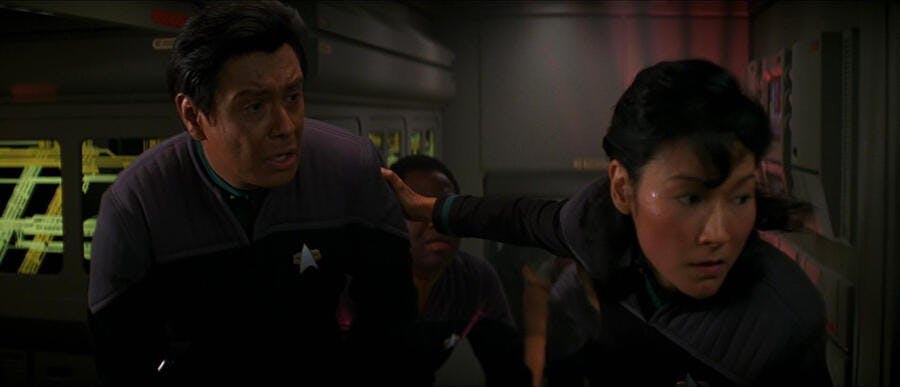
StarTrek.com
In far more extreme scenarios, she tended to sick and injured crew members after the Enterprise-D saucer section crashed on Veridian III in Star Trek Generations, and helped evacuate those aboard the Enterprise-E following an encounter with the Borg on the starship in Star Trek: First Contact.
In her psychological profile, ship counselor Deanna Troi assesses, "Ogawa displays a healthy cheerfulness and concern for her patient as will as a cool head in the type of crisis her career demands."
Work Besties
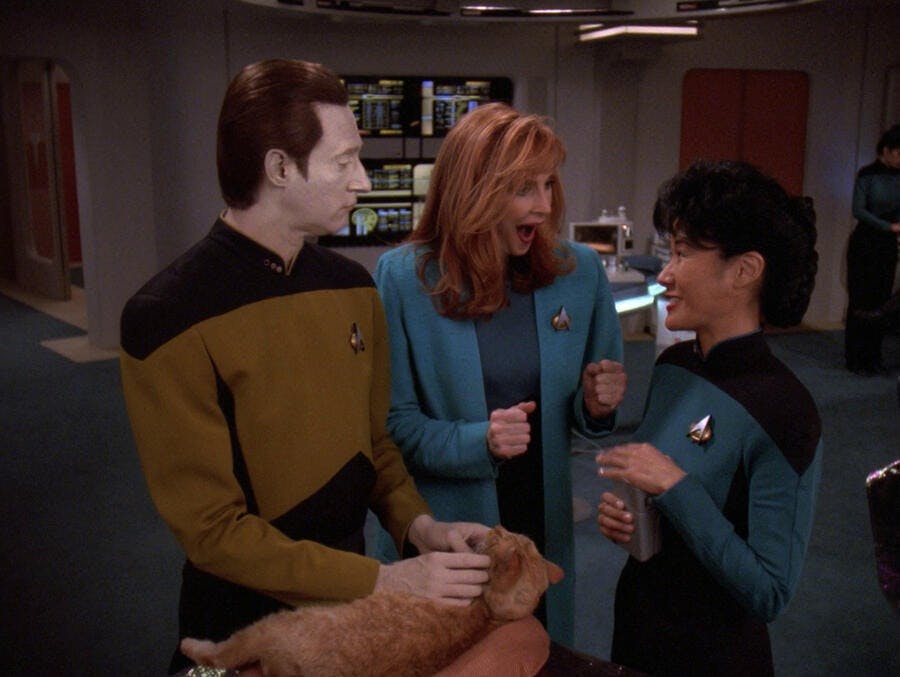
StarTrek.com
Some of my most meaningful friendships grew out of the workplace. On her tenure aboard the Enterprise, Nurse Alyssa Ogawa formed a deep friendship and mutual respect with the ship's chief medical officer, Dr. Beverly Crusher. On occasion, she has divulged details about her personal love life with Beverly, who often worried about the young officer.
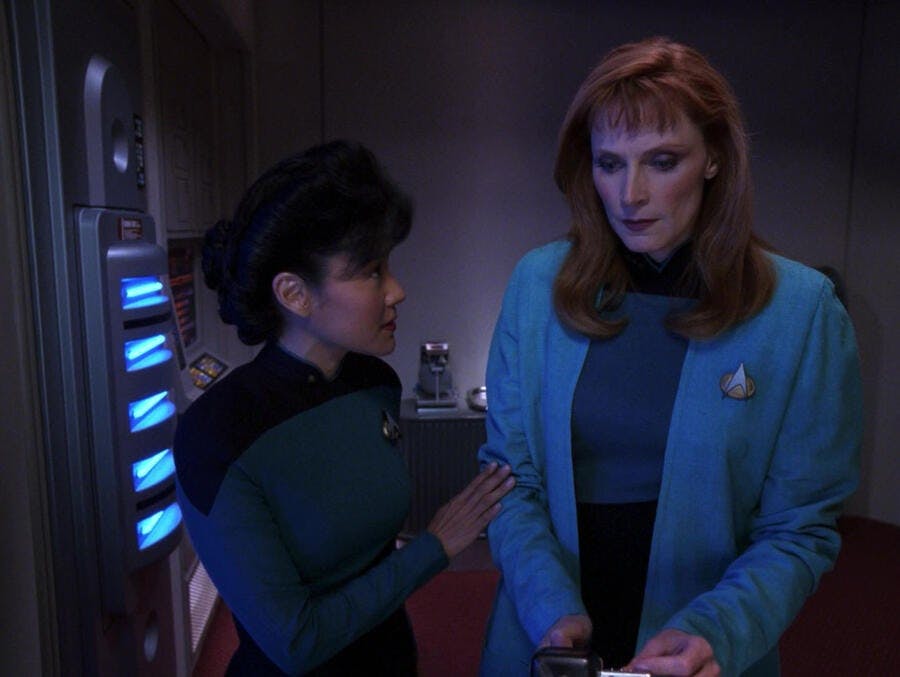
StarTrek.com
In her professional assessment of Nurse Ogawa, Dr. Crusher reported, "Ogawa has also demonstrated a personal bond and trust with her superior that no one in the department currently can match." Alyssa goes as far to risk her career , during Beverly's temporary relief from duty following her unsanctioned autopsy in "Suspicions."
In a 2015 interview with StarTrek.com, Patti Yasutake explains, "Alyssa had a great work ethic and was very dedicated to her job. But she also had a caring side, which is why I think Crusher and Troi often confided in her."
Work-Life Balance
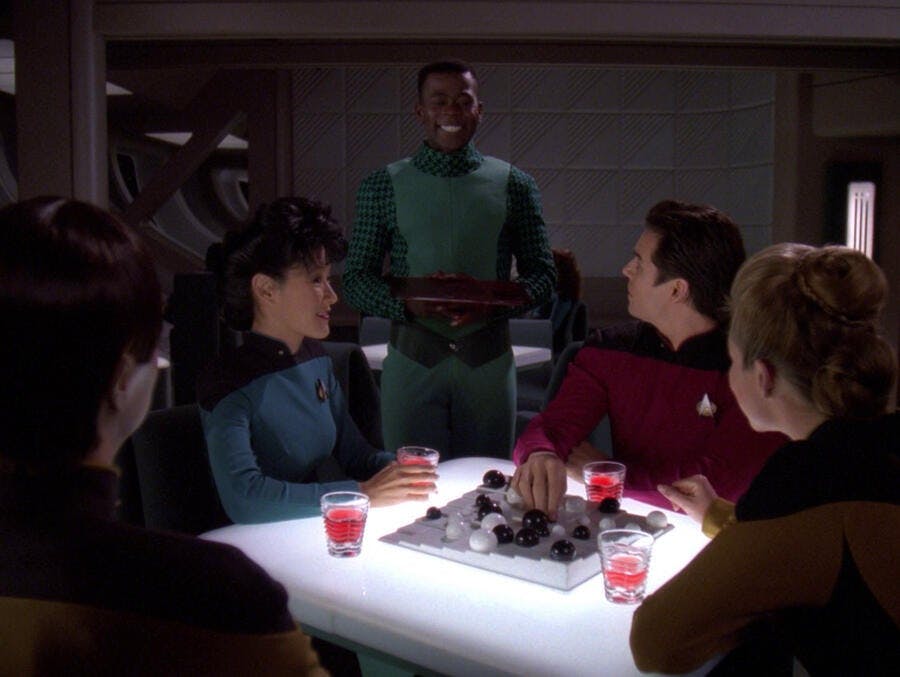
StarTrek.com
Like the senior officers on the Bridge, Alyssa navigates a well-rounded life aboard the Enterprise. She meets up with friends and colleagues over drinks at 10 Forward, frequently plays poker with them, as seen in "Lower Decks," and she even manages to find time for romance, going on Parisian dates on the Holodeck, and then later meeting and marrying Lieutenant Andrew Powell.
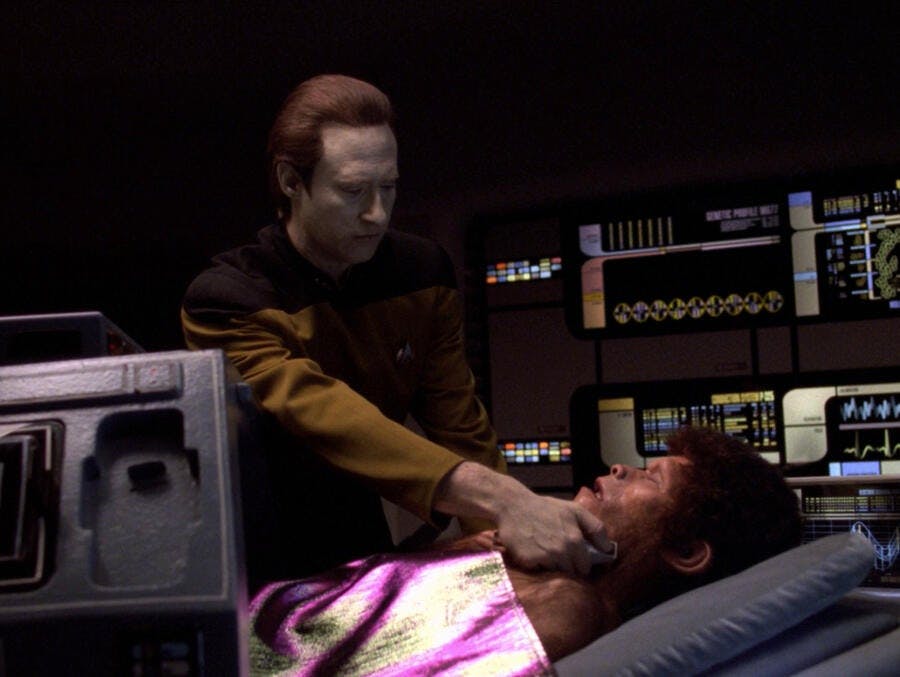
StarTrek.com
Shortly after the junior officer evaluations, Powell proposed to Ogawa and they begin to grow a family together. When the entire crew of the Enterprise is infected with Barclay's Protomorphosis Syndrome, the pregnant Ogawa and her unborn baby end up saving everyone thanks to the natural immunity benefits from her womb's amniotic fluid.
On-Screen Representation
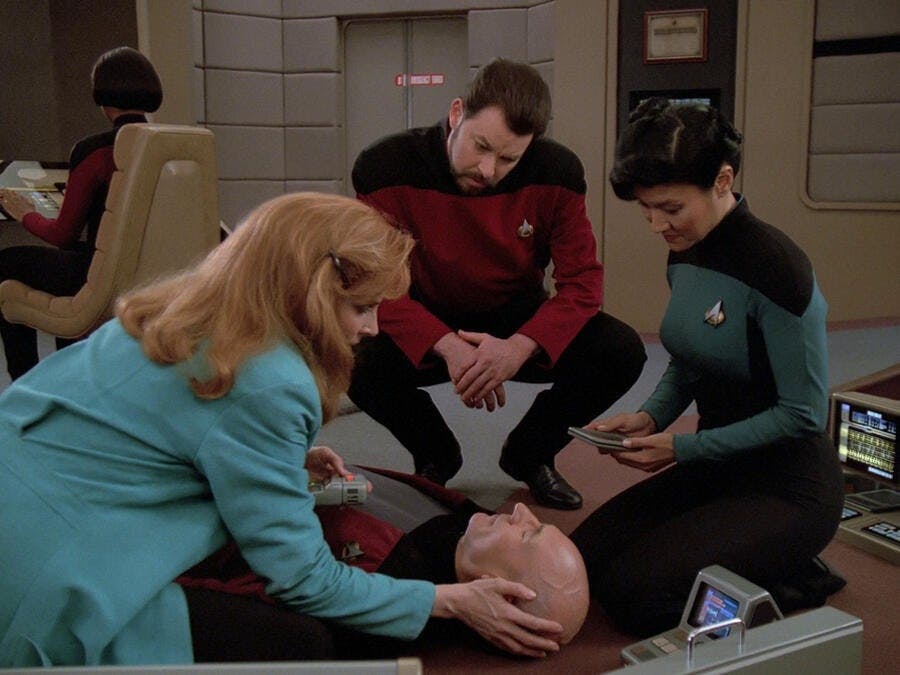
StarTrek.com
I have spoken about the “narrative scarcity” I encountered growing up as Asian American in the '90s and early '00s. There were so few characters who looked like me on-screen in Western media that I could count them on one hand — Trini Kwan, the yellow Power Ranger, on Mighty Morphin Power Rangers, the mutant Jubilee on X-Men: The Animated Series, and Mulan. Star Trek: The Next Generation, to me, was an embarrassment of riches because we had TWO recurring Asian characters — Keiko O’Brien and Alyssa Ogawa. What stands out about Alyssa Ogawa’s story is that it spoke to the Asian American experience but wasn’t about that.
In an interview with Netflix’s Tudum supporting her new project BEEF, Yasutake notes George Takei’s presence on the original series and then her own excitement in joining the iconic Star Trek franchise. I'm not the only fan who cared about the existence of Nurse Ogawa. Yasutake shares her fan experience with Tudum, “The fans are really, really supportive, and they stayed supportive over… we’re talking decades now.”
During a 2015 interview with StarTrek.com, Yasutake states, "It's really humbling to be a part of something that has had such a positive impact on so many people's lives." She goes on to say, "The show had an impact on a lot of people. It tackled important issues and it was so different from anything else that was on TV at the time. It was a show about exploration and new experiences, and I think that’s something that will always be relevant. I also think the characters were so well-developed and well-written that people really connected with them."
Narrative scarcity is critical because when marginalized groups don’t see themselves reflected and others don’t see us as an essential to any story, it affects our self-image and sense of belonging. The presence of Alyssa Ogawa on the starship Enterprise was essential in not only empowering and validating a new generation of women, but it also challenged and dismantled the negative tropes and portrayals of Asian American women in popular media.
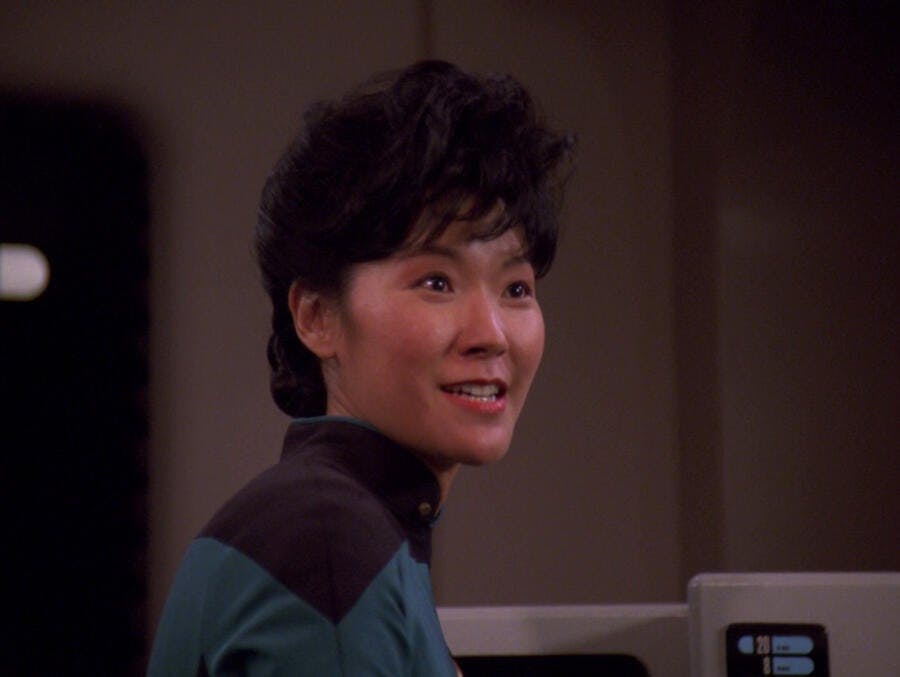
StarTrek.com
Yasutake tells Star Trek: The Magazine, "I'm proud to have been a part of something that has such a positive message of hope and exploration. Star Trek shows us a future where people of all races and cultures work together towards a common goal, and I think that's a message that's more important now than ever."
Just as Beverly Crusher, Deanna Troi, Jadzia Dax, Kira Nerys, Kathryn Janeway, and Seven of Nine represented a new wave of female characters in science fiction, Nurse Alyssa Ogawa join their ranks as an intelligent, nuanced, and empowered career-oriented figure who spoke to the audience of women during that time. Her story help shaped how young Asian American saw themselves and how they are perceived by others. Alyssa Ogawa is a symbol of hope for Star Trek’s promise of a more diverse and inclusive future.





